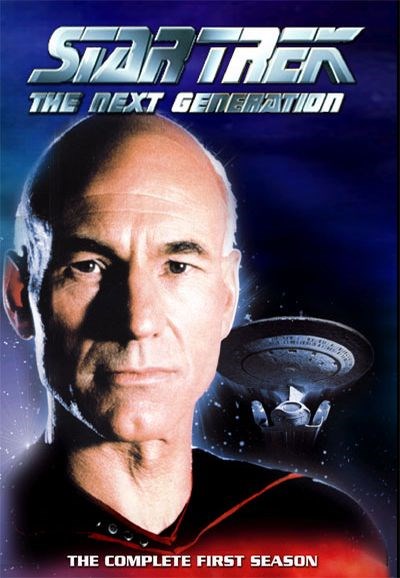Star Trek The Next Generation Season 1 Review
Is the future bound to be one of despair and the failings of the human race? Well not according to Star Trek The Next Generation which promotes a message that in the future humanity prospers and evolves past their “animalistic” natures such as found in the 21st century among humans. The first season of this show propels its audience into the world that this show creates with its premise setting it decades after the events of the original Star Trek TV show. The show takes place in the 24th century and follows the events of the universe-trotting mission of exploration led by Captain Jean-Luc Picard played by Patrick Stewart. The first season like the others is laid out episodically but it does do care to characterization arcs to allow the characters of the crew to be much more than one note characters who don’t develop. Star Trek The Next Generation’s first season succeeds in introducing the audience to a diverse group of characters and familiarizing it with the mythology and ideals in the fictional world of the 24th century.
The performers of the cast are excellent in portraying characters so far removed from our century. Patrick Stewart excellently portrays a captain who is hardened and accustomed to a certain way of life with little love for children who over time becomes accustomed to working with the Enterprise crew and starts to open up and trust them with his life. The writers starting Picard out as a cold character who didn’t initially connect well with his crew was a smart choice to bring a sense of realism to the season. Picard’s second in command William T. Riker or “Number One” played by Jonathan Frakes excellently portrays a man with a strong bravado and sense of manliness to him that turned down his own command to get the chance to serve aboard the Enterprise well. Perhaps the most different character on the crew than from what was seen on the original Star Trek TV show, Data, the android who doesn’t have emotion but possesses consciousness is played effectively by Brent Spiner. Spiner captures the perfect balance between mechanical and human in an intelligent manner with a great story arc played out with Data yearning to become more human. Levar Burton is great as Lt. Commander Geordi La Forge, engineer aboard the Enterprise, a man who is blind and who uses that to his advantage quite well. Marina Sirtis provides some good backbone to the cast and brings an emotional element to stories as Counselor Deanna Troi and brings in tension with another character Riker as a romantic past is hinted at between the two of them. Lieutenant Worf, the only Klingon officer in Starfleet is brought to life effectively by Michael Dorn. In the first season the writers play around with the concept of Worf’s feeling of disconnection to everything around him and that makes for good character dynamics as he stands alongside the other Starfleet officers on the Enterprise in the mission of exploration. I would say the two weakest cast members would be Lt. Tasha Yar played by Denise Crosby and Wesley Crusher played by Wil Wheaton. The two performances just feel forced to me as Tasha stands as the head security women and she always seems to push for equality and the writers seem to make to big a deal of it to an unnecessary extent. Also Wheaton as Wesley a 15 year old boy serving on a starship is a little cheesy and when he is the one who comes up with major solutions to problems repeatedly it makes the show feel less real. On the contrast Wheaton’s mother Dr. Beverly Crusher played by Gates McFadden makes a great impression and provides a grounded performance and some interesting character history as she is linked to a past between her, her dead husband, and Picard. The strong cast helps to support the theme that plays out during the first season.
This show attempts to bring to life the notion that in this fictional world people are good and not greedy like they are in the 20th and 21st centuries. The writers are promoting the idea that humanity pushes past its pettiness and evolves to look to the stars and work together in harmony. It also hints that humanity will face more destruction before it reaches that point with events such as World War Three and a doped up military. One episode suggests that TV stops being a form of entertainment in the 2040’s and humanity finds new ways to entertain themselves. This is shown in an episode when people from the 20th century wake up from an extended sleep in the 24th century and are appalled that since entertainment like TV is gone they can not think of what else there is to entertain themselves and one of the cast of the show seems to think nothing of it showing that the writers are trying to make a point that the crew of the Enterprise and humanity as a whole in the 24th century has moved beyond our ways of thinking and to better hopeful peaceful more constructive ways of living. It is refreshing to look back at the first season of Star Trek The Next Generation and to find that it promotes a message of hope for the future when our current media is so often plagued with dystopian tales of the future. The first season is often engaging and certainly has a great cast of characters with great performances from the cast and the show promotes a positive message about the future however the season does sometimes fail to live up to delivering engaging episodes and weak plots sometimes surface. Overall the first season of Star Trek The Next Generation is an engaging one which I am assigning a score of a B-.




Comments
Post a Comment